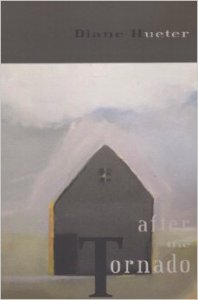 Diane Hueter. After the Tornado. Stephen F. Austin State University Press, 2013. 87 pgs. $16.00
Diane Hueter. After the Tornado. Stephen F. Austin State University Press, 2013. 87 pgs. $16.00
Reviewed by Lynn Domina
After the Tornado by Diane Hueter is the most character driven collection of poetry I’ve read in quite some time. Individually, the poems are (apparently) autobiographical lyrics exploring family and landscape—and the effect of landscape on family. Some members of the family appear in poem after poem, however, so the cumulative effect is—not exactly a story—but a presentation of atmosphere that suggests story. While the collection itself illustrates a narrative impulse, the individual poems vary sufficiently in style to keep the reader engaged and even occasionally surprised.
In “Digging Clams at Sequim Bay,” the speaker visits her childhood coastal home, recalling both the childhood and the occasions she took her own children to visit. But her memory is imprecise; she remembers her longing more intensely than she remembers the individuals who accompanied her:
Did I stand there with Josie
Balanced on my hip?
Or was it Erin, years later?
Someone whimpered over the cold
The sand
The wind
I watched the houses across the iron bay
To see if anyone came out
Paused at the shore
Or got in a boat to chug away.
No one did.
Through the light fog
The houses, red and white toys,
Lay scattered along the bank.
I waited for the fisherman
Or his wife
To stand waving from the headland
A miniature lighthouse
A beacon to the farther shore.
This center section of the poem is disconcerting not simply because the speaker can’t remember which child she held at the moment of this memory, but also because the speaker herself seems so alone in a desolate landscape. In another context, the “light fog” could become almost romantic, as slightly out-of-focus photographs can seem romanticized, but here, in the cold at the “iron bay,” the fog serves only to separate, to conceal. No one emerges from the houses; no one offers acknowledgment; no one serves as guide. Within the next several stanzas, the speaker recalls generalized experiences, those that occurred over and over again through each summer, until they seem like one extended memory. Finally, in the last stanza, she decides, “It must have been the summer we felt / Death hovering in the fog.” But even this understanding does not clarify her earlier confusion. The poem ends with this question: “Which damn child whispers into the sleeve of my coat / I’m cold, I’m cold, I’m cold?” The intensity of the emotion—“Which damn child”—suggests that the speaker is unusually invested in this memory. Readers, of course, understand that the cold whispering child may be neither Josie nor Erin, but the speaker herself waiting yet, her own childhood superimposed upon her children’s, comfortless still.
A poem with a similar but more ominous mood occurs close to the end of the collection. In “Icicles” a character identified only as “she” receives a phone call from her father announcing that a third character, “you,” has died. Similarly to “Digging Clams at Sequim Bay,” “Icicles” opens in darkness, cold, and isolation: “She stood in the chilled and darkened room / because the only telephone was in a room / shut off each year against the cold.” The woman listens to her father deliver his news, unsurprised at its content though startled by her own eventual reaction:
But it was the season they lost the pup to coyotes,
and the neighbor’s dog slaughtered all their chickens
when they were at work.
The winter they marveled at water spilled from a jug.
The time it froze as it hit the cooking pot—
then froze in the jug, too.
So it was winter when she learned of your death.
Images follow, of winter details, of ice—both so beautiful and so dangerous. Her father wouldn’t understand that for some people, including his daughter, this death might be good news. “You” is not someone she plans to mourn. The poem itself doesn’t reveal why the woman responds as she does, only that
for a moment, she was ready suddenly to say
as if it poured from her like water—
Good
Good I’m glad
But she stopped,
because it hurt so much she couldn’t see.
“Icicles” is one of the few poems in the collection not narrated in the first person, though it’s reasonable to assume a relationship between the “she” in this poem and the “I” in many of the others. Read in the context of the entire collection, “Icicles” gains meaning, similarly to how individual stories within collections of linked short stories acquire significance through their context. I won’t reveal here the interpretation other poems in After the Tornado suggest; instead, I will only compliment Hueter on her restraint. The poem is as effective as it is because readers can sense the effort at self-control the news demands of the woman.
At first glance, After the Tornado seems to be about the hardships of life on an unforgiving land. It seems to be about natural disaster. And it is about these things. More significantly though, the poems address personal disaster, as Hueter takes up the task of describing—through figurative language because literal language is insufficient—the effects of such disasters.
